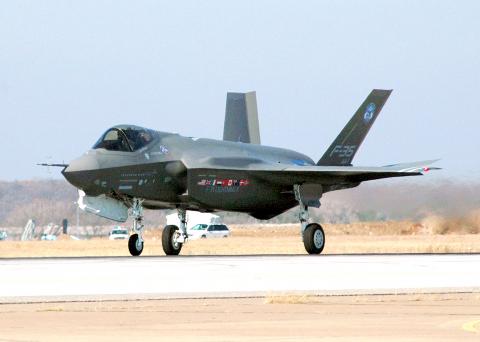F-35 stealth fighters are the new-generation combat aircraft that best serve the nation’s air defense needs, a military official said yesterday, the latest hint that the government might not be as keen to acquire the F-16C/Ds it has been requesting for years.
The F-35s, with their short takeoff capability, would bolster the country’s defense capabilities, since airports are likely to be destroyed by enemy forces in the event of war, the official said on condition of anonymity because of the sensitivity of the issue.
However, the fifth-generation aircraft remains under development and has faced a series of problems and rising costs. Defense analysts are also skeptical as to whether the US would agree to sell F-35s to Taiwan because of fears of possible technological transfer to China.

Photo: AFP / US NAVY
The official’s remarks came after the US House of Representatives voted earlier this month in favor of the US government selling 66 F-16C/Ds to Taiwan to help it close its military gap with China.
Taiwan has long lobbied Washington to sell it the fighters, but US President Barack Obama’s administration decided last year to offer Taiwan a retrofit package for its aging F-16A/B fleet rather than new F-16C/Ds.
Since then, the US Congress has pushed the Obama administration to also sell Taiwan the more advanced fighters, and following the House vote, the Ministry of National Defense issued a statement thanking it for its support.
However, it also said that Taiwan was reassessing its need for more advanced fighters because some of the functions of the upgraded F-16A/Bs were better than those of the F-16C/Ds, and it said that Taiwan, like Japan and Australia, would pursue the purchase of new-generation combat aircraft.
Because Japan and Australia have announced plans to buy F-35s, the statement triggered speculation that Taiwan’s interest in the F-16C/D aircraft had cooled. Asked about the issue, the official said the ministry would make an overall assessment of foreign purchases of military aircraft and make sure the defense budget is well spent.
“There are many options on the table,” the official said. “These include cutting the number of F-16C/Ds we have requested.”
In an interview, Ministry of National Defense spokesman Major General David Lo (羅紹和) reiterated Taiwan’s gratitude for US support and urged Washington to continue selling Taiwan defensive weapons based on the Taiwan Relations Act (TRA).
The TRA, enacted in 1979 when Washington and Taipei severed diplomatic ties, obliges the US to help Taiwan defend itself.
In September last year, the US approved the sale of a retrofit package for F-16A/B aircraft and related training at an estimated cost of US$5.85 billion, which the Executive Yuan has ordered should be brought down to about US$3.7 billion.

PREPAREDNESS: Given the difficulty of importing ammunition during wartime, the Ministry of National Defense said it would prioritize ‘coproduction’ partnerships A newly formed unit of the Marine Corps tasked with land-based security operations has recently replaced its aging, domestically produced rifles with more advanced, US-made M4A1 rifles, a source said yesterday. The unnamed source familiar with the matter said the First Security Battalion of the Marine Corps’ Air Defense and Base Guard Group has replaced its older T65K2 rifles, which have been in service since the late 1980s, with the newly received M4A1s. The source did not say exactly when the upgrade took place or how many M4A1s were issued to the battalion. The confirmation came after Chinese-language media reported

A Ministry of Foreign Affairs official yesterday said that a delegation that visited China for an APEC meeting did not receive any kind of treatment that downgraded Taiwan’s sovereignty. Department of International Organizations Director-General Jonathan Sun (孫儉元) said that he and a group of ministry officials visited Shenzhen, China, to attend the APEC Informal Senior Officials’ Meeting last month. The trip went “smoothly and safely” for all Taiwanese delegates, as the Chinese side arranged the trip in accordance with long-standing practices, Sun said at the ministry’s weekly briefing. The Taiwanese group did not encounter any political suppression, he said. Sun made the remarks when

The Taiwanese passport ranked 33rd in a global listing of passports by convenience this month, rising three places from last month’s ranking, but matching its position in January last year. The Henley Passport Index, an international ranking of passports by the number of designations its holder can travel to without a visa, showed that the Taiwan passport enables holders to travel to 139 countries and territories without a visa. Singapore’s passport was ranked the most powerful with visa-free access to 192 destinations out of 227, according to the index published on Tuesday by UK-based migration investment consultancy firm Henley and Partners. Japan’s and

BROAD AGREEMENT: The two are nearing a trade deal to reduce Taiwan’s tariff to 15% and a commitment for TSMC to build five more fabs, a ‘New York Times’ report said Taiwan and the US have reached a broad consensus on a trade deal, the Executive Yuan’s Office of Trade Negotiations said yesterday, after a report said that Washington is set to reduce Taiwan’s tariff rate to 15 percent. The New York Times on Monday reported that the two nations are nearing a trade deal to reduce Taiwan’s tariff rate to 15 percent and commit Taiwan Semiconductor Manufacturing Co (TSMC, 台積電) to building at least five more facilities in the US. “The agreement, which has been under negotiation for months, is being legally scrubbed and could be announced this month,” the paper said,